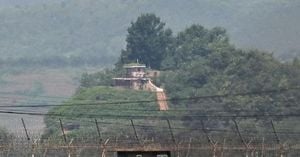Free speech advocates are raising alarms after reports emerged about a social studies teacher in Iowa who allegedly imposed a ban on various words and phrases within her classroom. This list includes surprising entries like the entire name of the state, 'Ohio,' along with modern slang terms such as 'rizz' and references to the Holocaust. The controversy centers around whether this ban infringes upon first amendment rights and how it fits within educational practices.
On December 19, 2023, the nonprofit Foundation for Individual Rights and Expression (FIRE) reached out to the Fremont-Mills Community School District, where the seventh-grade teacher reportedly enforced the ban. The group warned school officials about the unconstitutionality of the alleged speech restrictions, claiming these actions deny students their fundamental rights.
Aaron Terr, the director of public advocacy for FIRE, emphasized the delicate balance teachers must navigate. “Everyone agrees teachers have to prevent disruption,” he noted, but stressed, “a blanket ban on certain words and topics, regardless of the situation, goes too far.” He highlighted the need for schools to maintain open channels of communication and expression.
The list of banned words allegedly spans over 12 terms and includes phrases like "Diddy party," "baby oil," and "brain rot." According to the list, using any of these prohibited words could result in punishment, including detention lasting 30 minutes. At least ten students have reportedly faced discipline for using any of the banned terms.
Among the prohibited phrases, 'Ohio' stands out, particularly for its usage among the younger generation as slang for terms like "weird," "cringe," or "dumb," and 'rizz' is commonly understood as shorthand for "charisma." The term 'skibidi' refers to humorous social media videos featuring animated characters arising from toilets, raising questions about why educators target such innocent expressions.
School authorities attempted to clarify the situation, insisting the list was developed with student involvement. The district issued statements claiming it was part of their efforts to promote civic responsibility and to help students understand the impact of language on others. They argued the ban was not imposed to censor speech but to guide students toward fostering positive communication.
Nevertheless, some parents and advocacy groups express concern over this initiative's potential chilling effect on free expression. Following the uproar, officials revealed the list has not been displayed since the earlier part of the academic year, implying it may no longer be actively enforced.
FIRE pointed out the importance of allowing students to voice themselves freely, stating, "It is well-established public school students do not shed their First Amendment rights at the schoolhouse gate." This sentiment was echoed by Terr, referencing the landmark case Tinker v. Des Moines Independent Community School District, which affirmed students’ rights to free speech.
While schools have legitimate concerns about maintaining classroom decorum, FIRE insists there must be room for discussion and expression, especially when it involves subjects relevant to the curriculum. Terr remarked on the irony of banning terms related to significant historical events like the Holocaust, underscoring the educational value such topics can bring to discussions.
The controversy reflects broader national discussions about free speech on school campuses, where debates often arise over free expression versus the need for safe and respectful learning environments. Such discussions have gained momentum, as educators seek to navigate complex social issues amid ever-evolving cultural norms and political pressures.
The situation highlights the challenges school districts face as they balance educational goals, student rights, and societal expectations. With such diverse opinions on the issue, it becomes clear communication among parents, students, and educational authorities is more important than ever. Going forward, districts may need to strategically review their approaches to fostering positive environments for learning without stifling individual expression.
There's also the question of how student involvement plays out. With administrators claiming students were part of the decision to create this banned words list, it raises eyebrows about how much influence students genuinely have over their educational experience. Some critics argue this presents unintended consequences—students may feel empowered to police each other or inadvertently stifle their peers' creative expression.
The Fremont-Mills Community School District has until December 23 to respond to FIRE's request to lift the ban and align their policies with constitutional rights. This incident serves as another reminder of the delicate nature of discussions around language, free expression, and classroom decorum.
Meanwhile, as the discourse surrounding free speech continues, it remains to be seen how the school will address these concerns and whether similar incidents may arise across the country.



